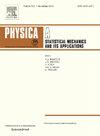超图中的动态角色转换:通过自适应惩罚和强化学习增强合作
IF 3.1
3区 物理与天体物理
Q2 PHYSICS, MULTIDISCIPLINARY
Physica A: Statistical Mechanics and its Applications
Pub Date : 2025-08-22
DOI:10.1016/j.physa.2025.130902
引用次数: 0
摘要
通过强化学习,进化博弈论提供了对复杂系统中集体行为至关重要的合作动力学的深刻见解。作为复杂的网络结构,超图为研究合作的出现提供了一个强有力的框架。在本研究中,我们将进化博弈论与超图结构优化的自适应q -学习算法相结合,探讨了动态惩罚转移机制对集体合作行为的影响。该算法允许代理动态调整角色并进行内省学习,超越了简单的模仿。大量的蒙特卡罗模拟表明,增加惩罚的概率和强度可以显著促进合作,而适度的惩罚成本即使在低协同因素下也可以促进合作。此外,更高的折扣因子、更高的学习率和更小的超图群体规模进一步增强了合作。本研究强调了自我调节q学习和动态惩罚过渡机制在促进合作中的关键作用,为复杂环境下的社会困境情境提供了有价值的见解。本文章由计算机程序翻译,如有差异,请以英文原文为准。
Dynamic role-switching in hypergraphs: Enhancing cooperation via adaptive punishment and reinforcement learning
Evolutionary game theory, enhanced by reinforcement learning, provides deep insights into cooperation dynamics crucial for collective behaviors in complex systems. As complex network structures, hypergraphs present a robust framework for examining the emergence of cooperation. In this study, we combine evolutionary game theory with an adaptive Q-learning algorithm optimized for hypergraphs structures to explore the effects of a dynamic punishment transition mechanism on collective cooperative behavior. This algorithm allows agents to dynamically adjust roles and engage in introspective learning, moving beyond simple imitation. Extensive Monte Carlo simulations demonstrate that increasing the probability and intensity of punishment significantly promotes cooperation, while moderate punishment costs can catalyze cooperation even under low synergy factors. Moreover, higher discount factors, increased learning rates, and smaller group sizes within hypergraphs further enhance cooperation. This research highlights the critical role of self-adjusting Q-learning and dynamic punishment transition mechanisms in fostering cooperation, providing valuable insights into social dilemma scenarios within complex environments.
求助全文
通过发布文献求助,成功后即可免费获取论文全文。
去求助
来源期刊
CiteScore
7.20
自引率
9.10%
发文量
852
审稿时长
6.6 months
期刊介绍:
Physica A: Statistical Mechanics and its Applications
Recognized by the European Physical Society
Physica A publishes research in the field of statistical mechanics and its applications.
Statistical mechanics sets out to explain the behaviour of macroscopic systems by studying the statistical properties of their microscopic constituents.
Applications of the techniques of statistical mechanics are widespread, and include: applications to physical systems such as solids, liquids and gases; applications to chemical and biological systems (colloids, interfaces, complex fluids, polymers and biopolymers, cell physics); and other interdisciplinary applications to for instance biological, economical and sociological systems.

 求助内容:
求助内容: 应助结果提醒方式:
应助结果提醒方式:


